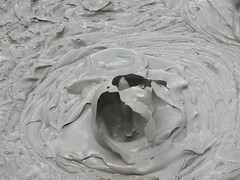A reader recently sent me this article about Haitians so poor they’ve resorted to making cookies from mud, salt and vegetable shortening and I’ve been wrestling with whether to pass it along.
 While I don’t want to be manipulative and say, ‘See, these kids eat mud cookies, you shouldn’t waste food,’ I sort of do. Now, I realize that the parental “Clean your plate, because there are starving children (somewhere)” is not cool. It’s like a summons for eating disorders, encouraging overconsumption and invites guilt to the dinner table.
While I don’t want to be manipulative and say, ‘See, these kids eat mud cookies, you shouldn’t waste food,’ I sort of do. Now, I realize that the parental “Clean your plate, because there are starving children (somewhere)” is not cool. It’s like a summons for eating disorders, encouraging overconsumption and invites guilt to the dinner table.
Yet, I do think it’s important to recognize that others, even Americans, are starving in a day where enhanced farming technology provides bountiful harvests. It’s useful to be reminded from time to time about how fortunate we are. And if you have a computer and are reading this, you’re probably pretty lucky (although maybe less so to have navigated to this page).
Considering all that, here’s what I’d say:
If you have reasonably-sized crockery serve sensible portions and don’t suffer from an eating disorder, you should try to clean your plate. And if you find yourself getting full, save the leftovers.
End of rant. Apologies if that got too preachy.
One Trackback
[…] 4) Wasted Food - Jonathan Bloom examines how and why America wastes nearly half its food. The average American throws out over half a pound of food everyday ““ that’s about 12.5% of their overall daily garbage. It might not seem like a lot, but at the end of the year it amounts to 30 million tons of food waste in landfills emitting methane, a greenhouse gas 20 times more harmful than carbon dioxide. Kind of disheartening, when you think about the fact there are people in the world who are so malnourished, they’ve resorted to eating mud. Bloom provides helpful food donation/recovery action tips for both individuals and businesses. […]